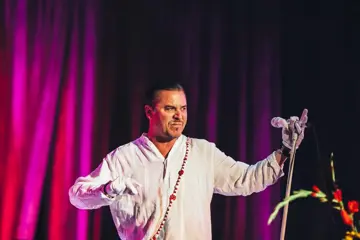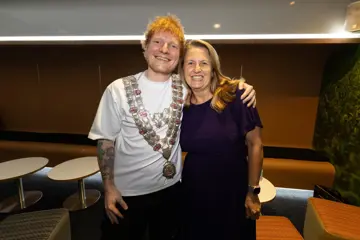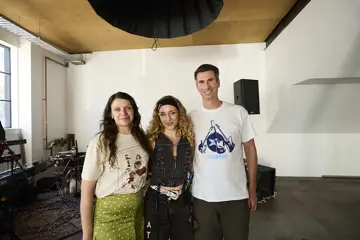Back in the '90s, Dubmarine frontman D-Kazman was a youngster from Cairns who followed the beat to Brisbane to have a crack at a larger music scene with his band Hot Rubber Glove. As some members dispersed back to north Queensland, Kazman went in search of an outfit to act as a vehicle for his inimitable lyricism that speaks of spirituality, social issues, Indigenous culture and the joy of music.
“I just said to myself, 'Man, I need a new band – I need a new dance band that's gonna go crazy and gonna be the wickedest thing in the world,'” says the frontman of chancing upon four future Dubmarine journeymen jamming at a house party soon after. “I had a song in my head that I'd written prior to that moment and I just sort of let the lyrics flow into what they were doin' and it seemed absolutely natural. We turned around and everyone's just on tables, dancing and jumping and going crazy and it was like, 'Yes, we've got the formula!'”
With 2010's debut album Depth Of Sound capturing the reggae, roots and dancehall vibes of the eight-piece, Kazman explains how the approach and sound has changed ahead of follow-up Laser Beam Sounds.
“We're sort of delving into newer areas, new bass culture areas like trap music and that sort of idea, and mixing up some of our tunes – modernising it a bit and putting a few more toys in there,” he tells. “The album itself sounds fantastic; we've got Magoo onboard to produce everything and [longtime collaborator] Paulie B, he did most of the tracking and he's a guy that we know very well. We're very close friends and he went out of his way to try and capture our live sound, which didn't really translate last time with our last album.”
Don't miss a beat with our FREE daily newsletter
Extensive overseas jaunts have also influenced the 2013 form of Dubmarine, particularly the super-sized brass vibes inspired by a band at a South African jazz festival.
“They were like a super jazz future band with lots of toys and stuff, and one of the guys used a lot of effects on his saxophone and we were like, 'Oh that sounds rad', and then we thought, 'Well why can't we do that?' And it grew from there,” says Kazman, who also notes interpreting The Prodigy's Fat Of The Land as part of Brisbane Powerhouse's Long Player Sessions last year as a key moment for defining Dubmarine's sound.
“We spent a lot of time putting it together and getting the right sound, and our drummer Joel Alexander, he did a lot of work in getting all the right samples and the noises and sounds and so on, and from that we saw that we could do that, mimic those sort of vibes. We've always been going down that path anyway; we've always been big into synthesisers and big crazy noises, so it just really helped us and this phase is very industrial in a way… We're just tryin' to mix it all up from that dance vibe to that industrial vibe to the roots vibe.”
The industrial edge is quite evident from the first siren-like blare of the album's debut single Beat In Control, a song that Kazman dreamt up whilst working as a night club dancer who wanted to communicate what it felt like to be inside the music.
“That song itself, the lyrics were written 20 years ago,” he offers. “It was one of those tunes; you find it a lot with musicians who will write with an idea in mind, and then you try it out and it's not really working, and that's how it was for me with that tune years ago trying to find the right music, the right DJs, the right production – nothing really fitted until one day we just decided with Dubmarine, let's try creating something with a bit of a crunk background, a sort of hard edge hip hop thing and then it worked!”
Elsewhere across Laser Sound Beam, much heavier topics are explored. Bullyman looks at Indigenous deaths in custody and in particular the 2004 Palm Island incident in which police officer Chris Hurley was accused of the manslaughter of Indigenous man Mr Doomadge. In the days before Hurley's 2007 acquittal, Powderfinger were pressured to change their song Black Tears because of a concern the topical lyrics could prejudice the jury. After doing workshops on Palm Island, Kazman was particularly moved by these events, and particularly outraged by the attempt at censorship.
“It was three things that happened all in that one day when [the song] happened. It was number one, the acquittal,” asserts Kazman of Bullyman. “Number two, that [Powderfinger] song, and number three, we were there – me and my band were there and we were coming up with that groove, the music itself. As soon as those three things came together these lyrics just came out of the universe…
“I was lucky enough maybe a year later to get invited with Dubmarine to go play on Palm Island and sing that song, and I actually sang it to the mother of the gentleman that got murdered. She asked me to recite the lyrics to her after the show… To me it was a song that had power and lyrics and a message that's so true to today and has been for fifty years or more, you know all the way back; generally everyone is aware of deaths in custody and the fact that it still happens. There's an injustice there and this song is about that. But at the same time, it's a call out to my Indigenous brothers and sisters; don't give up on life.”














